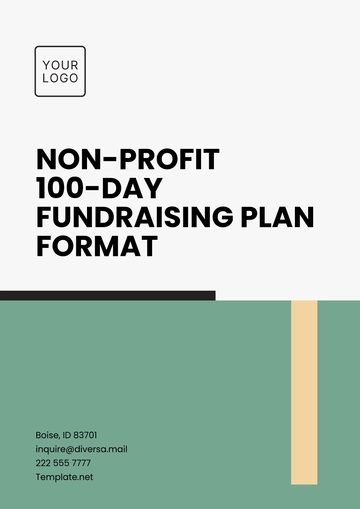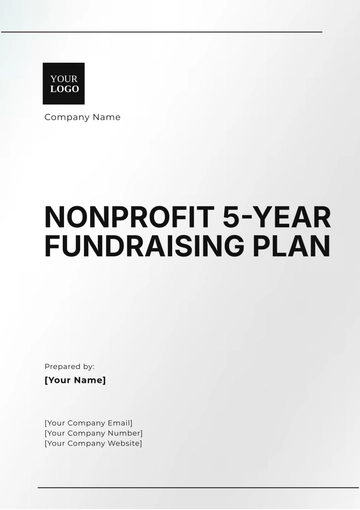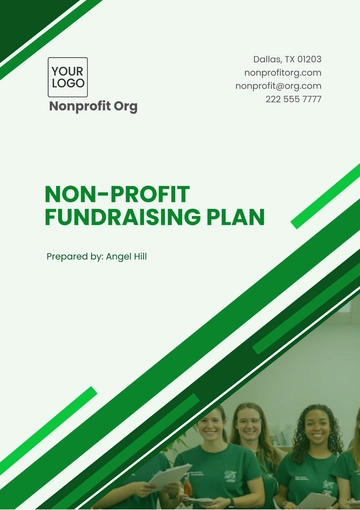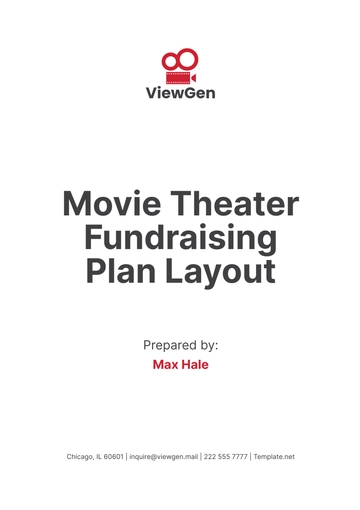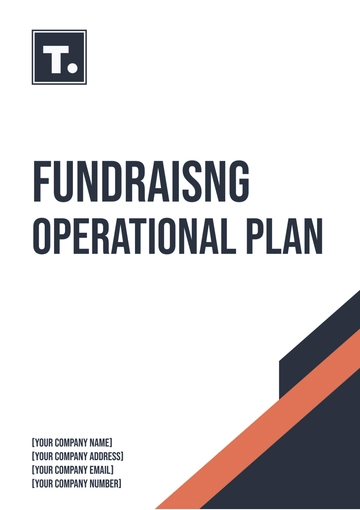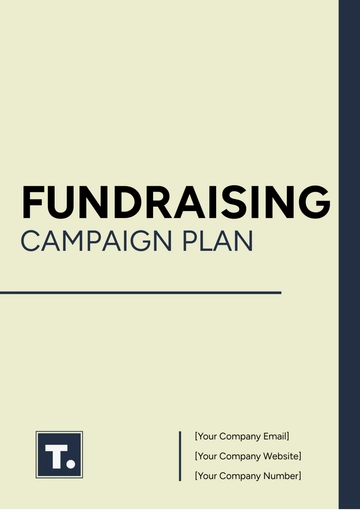Free Movie Theater Fundraising Plan Layout
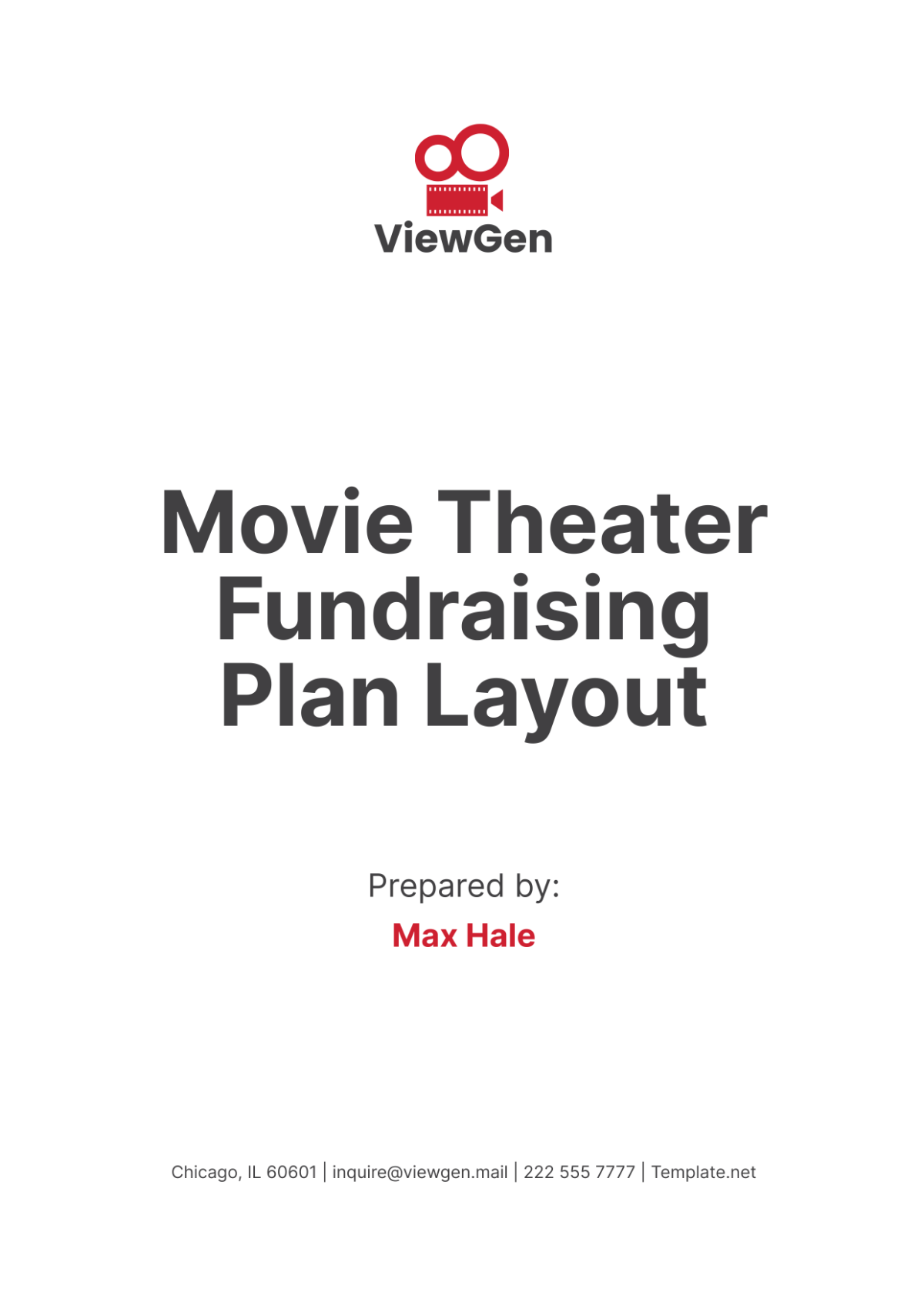
Introduction
(Creating a fundraising plan for a movie theater involves detailed planning and strategic thinking. This document serves as a guide to help you structure a comprehensive fundraising plan. Follow the instructions in each section to develop your customized plan.)
1. Executive Summary
Introduction
(The executive summary provides a concise overview of the entire fundraising plan. Summarize the key points, including the purpose of the fundraiser, the financial goal, and the main strategies to be used.)
1.1 Purpose of the Fundraiser
(Describe the specific reason for the fundraiser, such as upgrading theater facilities, expanding the theater, or launching new programs. Clearly state why funds are needed.)
1.2 Fundraising Goal
(Set a clear and achievable financial goal. Specify the total amount of money you aim to raise and the timeframe for achieving this goal.)
1.3 Key Strategies
(Briefly outline the main fundraising strategies you plan to use. This could include events, online campaigns, partnerships, grants, and sponsorships.)
2. Background Information
Introduction
(Provide context and background information about the movie theater. This section helps potential donors understand the theater's history, mission, and current situation.)
2.1 Theater History
(Give a brief history of the movie theater, including its founding, major milestones, and any notable achievements.)
2.2 Mission and Vision
(Explain the theater's mission and vision. Highlight how the theater serves the community and its long-term goals.)
2.3 Current Situation
(Describe the current state of the theater, including its financial health, recent challenges, and opportunities for growth.)
3. Fundraising Strategies
Introduction
(This section outlines the various strategies you will use to raise funds. Include detailed instructions for planning and executing each strategy.)
3.1 Events
(Plan and organize fundraising events such as movie marathons, gala nights, and themed parties. Provide details on event planning, promotion, and execution.)
3.2 Online Campaigns
(Develop online fundraising campaigns using platforms like GoFundMe, Kickstarter, or Indiegogo. Include tips for creating compelling campaign pages, leveraging social media, and engaging supporters.)
3.3 Partnerships and Sponsorships
(Identify potential partners and sponsors who can support your fundraising efforts. Outline steps for approaching businesses, negotiating sponsorship deals, and maintaining relationships.)
3.4 Grants
(Research and apply for grants from foundations, government programs, and other organizations. Provide guidance on finding grant opportunities, writing proposals, and meeting application requirements.)
3.5 Donations
(Set up mechanisms for receiving direct donations from individuals and organizations. Include instructions for creating donation pages on your website, setting up donation boxes at the theater, and organizing donor recognition programs.)
4. Marketing and Promotion
Introduction
(Marketing and promotion are crucial for the success of your fundraising efforts. This section provides strategies for spreading the word and attracting donors.)
4.1 Branding and Messaging
(Develop a consistent brand and messaging for your fundraising campaign. Ensure that all promotional materials reflect your theater's mission and goals.)
4.2 Social Media
(Use social media platforms to promote your fundraising efforts. Include tips for creating engaging content, using hashtags, and interacting with followers.)
4.3 Email Campaigns
(Create email campaigns to keep your supporters informed and engaged. Provide guidelines for crafting effective emails, building a subscriber list, and measuring campaign success.)
4.4 Media Relations
(Engage with local media to gain coverage for your fundraising efforts. Provide instructions for writing press releases, contacting journalists, and arranging interviews.)
4.5 Community Outreach
(Reach out to the local community through partnerships with schools, community groups, and other organizations. Include tips for organizing community events and building local support.)
5. Budget and Financial Plan
Introduction
(A well-defined budget and financial plan are essential for managing your fundraising efforts. This section provides instructions for creating and maintaining your fundraising budget.)
5.1 Expense Projection
(Estimate the expenses associated with your fundraising activities. Include costs for event planning, marketing materials, staff time, and other necessary resources.)
5.2 Revenue Projection
(Project the revenue you expect to generate from each fundraising strategy. Include conservative and optimistic estimates to account for different scenarios.)
5.3 Financial Tracking
(Set up a system for tracking expenses and revenue throughout the fundraising campaign. Provide tips for using financial software or spreadsheets to monitor your progress.)
5.4 Financial Reporting
(Prepare regular financial reports to update stakeholders on the progress of your fundraising efforts. Include instructions for creating clear and concise reports that highlight key metrics and achievements.)
6. Implementation Timeline
Introduction
(An implementation timeline helps ensure that your fundraising efforts stay on track. This section provides guidance on creating a detailed timeline for your campaign.)
6.1 Planning Phase
(Outline the steps to be taken during the planning phase, including setting goals, researching strategies, and preparing materials. Provide a timeline for completing each task.)
6.2 Execution Phase
(Detail the actions to be taken during the execution phase, such as launching campaigns, hosting events, and promoting your efforts. Include specific dates and deadlines for each activity.)
6.3 Evaluation Phase
(Describe the steps to be taken during the evaluation phase, including analyzing results, gathering feedback, and planning for future efforts. Provide a timeline for completing each evaluation task.)
7. Evaluation and Assessment
Introduction
(Evaluating and assessing your fundraising efforts is crucial for understanding what worked and what didn’t. This section provides guidelines for evaluating the success of your campaign.)
7.1 Key Performance Indicators (KPIs)
(Identify the key performance indicators that will be used to measure the success of your fundraising efforts. These might include total funds raised, number of donors, event attendance, and social media engagement.)
7.2 Data Collection
(Outline the methods for collecting data related to your KPIs. This might include surveys, financial records, attendance logs, and social media analytics.)
7.3 Analysis and Reporting
(Provide instructions for analyzing the collected data to identify trends and insights. Include tips for creating detailed reports that summarize your findings and provide recommendations for future campaigns.)
7.4 Feedback and Improvement
(Encourage gathering feedback from donors, volunteers, and staff to identify areas for improvement. Provide guidelines for conducting feedback sessions and incorporating suggestions into future fundraising plans.)
Conclusion
(Summarize the key points of the fundraising plan and reiterate the importance of each section. Emphasize the impact that successful fundraising will have on the movie theater’s future. Encourage commitment and participation from all stakeholders to achieve the fundraising goals.)
Contact Details
For more information or inquiries, please contact:
[Your Name]
[Your Email]
[Your Company Name]
[Your Company Email]
[Your Company Address]
[Your Company Number]
[Your Company Website]
[Your Company Social Media]
This layout serves as a comprehensive guide for creating a movie theater fundraising plan. By following these instructions and tailoring each section to your specific needs, you can develop a detailed and effective fundraising strategy to support your theater's goals and initiatives.
- 100% Customizable, free editor
- Access 1 Million+ Templates, photo’s & graphics
- Download or share as a template
- Click and replace photos, graphics, text, backgrounds
- Resize, crop, AI write & more
- Access advanced editor
Secure the funds you need with Template.net's Movie Theater Fundraising Plan Layout Template. This editable and customizable template, accessible through our AI editor tool, offers a comprehensive structure for outlining your funding goals and strategies. It's tailored to help movie theaters effectively engage donors and sponsors to support various cinematic projects or enhancements.
You may also like
- Finance Plan
- Construction Plan
- Sales Plan
- Development Plan
- Career Plan
- Budget Plan
- HR Plan
- Education Plan
- Transition Plan
- Work Plan
- Training Plan
- Communication Plan
- Operation Plan
- Health And Safety Plan
- Strategy Plan
- Professional Development Plan
- Advertising Plan
- Risk Management Plan
- Restaurant Plan
- School Plan
- Nursing Home Patient Care Plan
- Nursing Care Plan
- Plan Event
- Startup Plan
- Social Media Plan
- Staffing Plan
- Annual Plan
- Content Plan
- Payment Plan
- Implementation Plan
- Hotel Plan
- Workout Plan
- Accounting Plan
- Campaign Plan
- Essay Plan
- 30 60 90 Day Plan
- Research Plan
- Recruitment Plan
- 90 Day Plan
- Quarterly Plan
- Emergency Plan
- 5 Year Plan
- Gym Plan
- Personal Plan
- IT and Software Plan
- Treatment Plan
- Real Estate Plan
- Law Firm Plan
- Healthcare Plan
- Improvement Plan
- Media Plan
- 5 Year Business Plan
- Learning Plan
- Marketing Campaign Plan
- Travel Agency Plan
- Cleaning Services Plan
- Interior Design Plan
- Performance Plan
- PR Plan
- Birth Plan
- Life Plan
- SEO Plan
- Disaster Recovery Plan
- Continuity Plan
- Launch Plan
- Legal Plan
- Behavior Plan
- Performance Improvement Plan
- Salon Plan
- Security Plan
- Security Management Plan
- Employee Development Plan
- Quality Plan
- Service Improvement Plan
- Growth Plan
- Incident Response Plan
- Basketball Plan
- Emergency Action Plan
- Product Launch Plan
- Spa Plan
- Employee Training Plan
- Data Analysis Plan
- Employee Action Plan
- Territory Plan
- Audit Plan
- Classroom Plan
- Activity Plan
- Parenting Plan
- Care Plan
- Project Execution Plan
- Exercise Plan
- Internship Plan
- Software Development Plan
- Continuous Improvement Plan
- Leave Plan
- 90 Day Sales Plan
- Advertising Agency Plan
- Employee Transition Plan
- Smart Action Plan
- Workplace Safety Plan
- Behavior Change Plan
- Contingency Plan
- Continuity of Operations Plan
- Health Plan
- Quality Control Plan
- Self Plan
- Sports Development Plan
- Change Management Plan
- Ecommerce Plan
- Personal Financial Plan
- Process Improvement Plan
- 30-60-90 Day Sales Plan
- Crisis Management Plan
- Engagement Plan
- Execution Plan
- Pandemic Plan
- Quality Assurance Plan
- Service Continuity Plan
- Agile Project Plan
- Fundraising Plan
- Job Transition Plan
- Asset Maintenance Plan
- Maintenance Plan
- Software Test Plan
- Staff Training and Development Plan
- 3 Year Plan
- Brand Activation Plan
- Release Plan
- Resource Plan
- Risk Mitigation Plan
- Teacher Plan
- 30 60 90 Day Plan for New Manager
- Food Safety Plan
- Food Truck Plan
- Hiring Plan
- Quality Management Plan
- Wellness Plan
- Behavior Intervention Plan
- Bonus Plan
- Investment Plan
- Maternity Leave Plan
- Pandemic Response Plan
- Succession Planning
- Coaching Plan
- Configuration Management Plan
- Remote Work Plan
- Self Care Plan
- Teaching Plan
- 100-Day Plan
- HACCP Plan
- Student Plan
- Sustainability Plan
- 30 60 90 Day Plan for Interview
- Access Plan
- Site Specific Safety Plan
